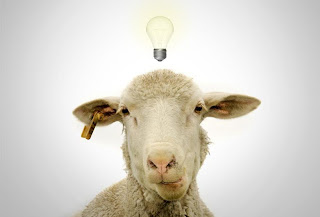
I was going back through Frye and I noticed that I had underlined and starred the following passage:
"But a myth on this lower level may be a lie and still represent true indoctrination, and true indoctrination is the real social function of literature" (Frye, 19).
This was more than likely one of those sentences that flew right over my head as my eyes flew over the page, trying to digest what I could late one night. I really didn't understand it and probably still don't. So I thought it might be a reasonable thing to try to pick apart here, since it will force me to think about it a little deeper.
On the surface, this seems to give a very crisp answer to the question, "what's the use of stories that aren't even true?" What's the use? Apparently it's indoctrination - shoving ideas down people's throats. Ok, that's a little harsh, but it seems sort of funny to me that we use fiction - something that obviously isn't true - to plant unproven ideas, ideas that we are told not to question, into other people's heads. Basically, Frye is saying that the real function of literature, as it pertains to the social aspects, is to tell people how they should think.
Weird.
But is it true? I guess it kind of is. A full understanding takes a deep understanding of truth, as Plato seemed to perseverate on in his teachings about reality. But Plato seemed to say that reality in our own heads is guided mostly by perception. And how a particular story is perceived determines largely how we view the story's content, and therefore, our reality.
Frye uses the example of myth versus fables, "one being at the top and one being at the bottom of his vision of reality." The indoctrination in myth is more widely accepted because of its tradition. Therefore, the teachings of myths are thought to be more true.
I can't help but think that some of this has to point back to the popularity of romance among the masses. Romance has a high morality and, thus, a comfort factor, among its readers. The quest, the revelation, the happy ending, even the apparent death all sit well with most people. It justifies what most people hold in their brains as "right" and we, as do Chloe's sheep to the fields, follow that primal instinct to our comfort zone.
So the structure of the story, rather than the content, will lend it its ethos. Invoking more of the oceans streams leaves us with more warm fuzzies by showing us first something that is familiar and only teasing us with adventure, death or tragedy. Because, in the end, we will be left satisfied, if that is how our brain works. If we are a sheep, we will accept almost anything within the romance structure, as long as there is a happy ending.
But I must ask, then, who is the sheep? The author or the audience? As a writer, I take offense to the idea that I must accept a certain genre as the way to communicate my ideas. As a reader, I reject the idea that I am unknowingly being indoctrinated because I enjoy a story such as Daphnis and Chloe. I feel sophisticated enough to be able to pick apart what I enjoy and what is morality woven into the story. Or am I?
I am reminded of a passage from The Two Gentlemen of Verona here:
Speed: "The shepherd seeks the sheep, and not the sheep the shepherd; but I seek my master, and my master seeks not me. Therefore I am no sheep."
Proteus: "The sheep for fodder follow the shepherd, the shepherd for food follows not the sheep; thou for wages followest thy master, thy master for wages follows not thee. Therefore thou art a sheep."
As maddening as this line of logic is, I think it represents the spinning in which my brain is now engaged. I suppose as a writer I need to write to an audience in order to accomplish my goal of having someone read my work, if that is indeed my goal. And perhaps the price of ingesting a good story may be absorbing a bit of ideology from the author.
Did the authors of the Christian bible really want a romance as the basis for their epic story? Who can say? But they certainly employed this genre as evidenced by the quest of Jesus to spread Christianity, his apparent death, the revelation of his resurrection and the happy ending, in which he and all "good" Christians will ascend into heaven to be with God, the very definition of Love as expounded by the religion.
Wow. Breakthrough? I think not. But I think I'm getting a little bit more of the forest through the trees here. Abu Kasem's Slippers is a pretty good story. I know it's not true, but I get the message. Sure, it made me think. I'm not ready to change my shoes in the literal sense, but I get the methaphorical significance, the "visible sign of his unpalatable greed" (Campbell, 9). It made me think about my karma and my ego. If that makes me a sheep, so be it. But I'll bet it makes me a smarter sheep than the rest, and I think that's probably a good thing.
No comments:
Post a Comment